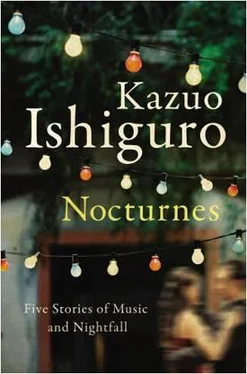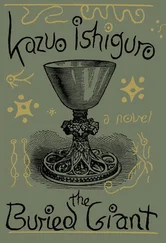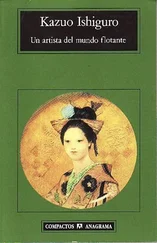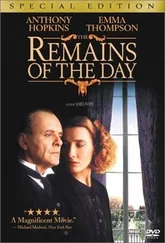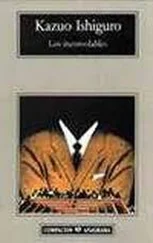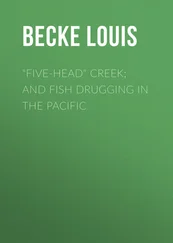Vittorio seemed pleased with what he was given, and with his usual fine phrases and gestures, he got back in his gondola and set off down the canal.
We watched him disappear into the dark, then next thing, Mr. Gardner was pushing a lot of notes into my hand. I told him it was way too much, that anyway it was a huge honour for me, but he wouldn’t hear of taking any of it back.
“No, no,” he said, waving his hand in front of his face, like he wanted to be done, not just with the money, but with me, the evening, maybe this whole section of his life. He started to walk off towards his palazzo, but after a few paces, he stopped and turned back to look at me. The little street we were in, the canal, everything was silent now except for the distant sound of a television.
“You played well tonight, my friend,” he said. “You have a nice touch.”
“Thank you, Mr. Gardner. And you sang great. As great as ever.”
“Maybe I’ll come by the square again before we leave. Listen to you playing with your crew.”
“I hope so, Mr. Gardner.”
But I never saw him again. I heard a few months later, in the autumn, that Mr. and Mrs. Gardner got their divorce-one of the waiters at the Florian read it somewhere and told me. It all came back to me then about that evening, and it made me feel a little sad thinking about it again. Because Mr. Gardner had seemed a pretty decent guy, and whichever way you look at it, comeback or no comeback, he’ll always be one of the greats.
LIKE ME, EMILY LOVED old American popular songs. She’d go more for the up-tempo numbers, like Irving Berlin’s “Cheek to Cheek” and Cole Porter’s “Begin the Beguine,” while I’d lean towards the bitter-sweet ballads-“Here’s That Rainy Day” or “It Never Entered My Mind.” But there was a big overlap, and anyway, back then, on a university campus in the south of England, it was a near-miracle to find anyone else who shared such passions. Today, a young person’s likely to listen to any sort of music. My nephew, who starts university this autumn, is going through his Argentinian tango phase. He also likes Edith Piaf as well as any number of the latest indie bands. But in our day tastes weren’t nearly so diverse. My fellow students fell into two broad camps: the hippie types with their long hair and flowing garments who liked “progressive rock,” and the neat, tweedy ones who considered anything other than classical music a horrible din. Occasionally you’d bump into someone who professed to be into jazz, but this would always turn out to be of the so-called crossover kind-endless improvisations with no respect for the beautifully crafted songs used as their starting points.
So it was a relief to discover someone else, and a girl at that, who appreciated the Great American Songbook. Like me, Emily collected LPs with sensitive, straightforward vocal interpretations of the standards-you could often find such records going cheap in junk shops, discarded by our parents’ generation. She favoured Sarah Vaughan and Chet Baker. I preferred Julie London and Peggy Lee. Neither of us was big on Sinatra or Ella Fitzgerald.
In that first year, Emily lived in college, and she had in her room a portable record player, a type that was quite common then. It looked like a large hat box, with pale-blue leatherette surfaces and a single built-in speaker. Only when you raised its lid would you see the turntable sitting inside. It gave out a pretty primitive sound by today’s standards, but I remember us crouching around it happily for hours, taking off one track, carefully lowering the needle down onto another. We loved playing different versions of the same song, then arguing about the lyrics, or about the singers’ interpretations. Was that line really supposed to be sung so ironically? Was it better to sing “Georgia on My Mind” as though Georgia was a woman or the place in America? We were especially pleased when we found a recording-like Ray Charles singing “Come Rain or Come Shine”-where the words themselves were happy, but the interpretation was pure heartbreak.
Emily’s love of these records was obviously so deep that I’d be taken aback each time I stumbled on her talking to other students about some pretentious rock band or vacuous Californian singer-songwriter. At times, she’d start arguing about a “concept” album in much the way she and I would discuss Gershwin or Harold Arlen, and then I’d have to bite my lip not to show my irritation.
Back then, Emily was slim and beautiful, and if she hadn’t settled on Charlie so early in her university career, I’m sure she’d have had a whole bunch of men competing for her. But she was never flirty or tarty, so once she was with Charlie, the other suitors backed off.
“That’s the only reason I keep Charlie around,” she told me once, with a dead straight face, then burst out laughing when I looked shocked. “Just a joke, silly. Charlie is my darling, my darling, my darling.”
Charlie was my best friend at university. During that first year, we hung around together the whole time and that was how I’d come to know Emily. In the second year, Charlie and Emily got a house-share down in town, and though I was a frequent visitor, those discussions with Emily around her record player became a thing of the past. For a start, whenever I called round to the house, there were several other students sitting around, laughing and talking, and there was now a fancy stereo system churning out rock music you had to shout over.
Charlie and I have remained close friends through the years. We may not see each other as much as we once did, but that’s mainly down to distances. I’ve spent years here in Spain, as well as in Italy and Portugal, while Charlie’s always based himself in London. Now if that makes it sound like I’m the jet-setter and he’s the stay-at-home, that would be funny. Because in fact Charlie’s the one who’s always flying off-to Texas, Tokyo, New York-to his high-powered meetings, while I’ve been stuck in the same humid buildings year after year, setting spelling tests or conducting the same conversations in slowed-down English. My-name-is-Ray. What-is-your-name? Do-you-have-children?
When I first took up English teaching after university, it seemed a good enough life-much like an extension of university. Language schools were mushrooming all over Europe, and if the teaching was tedious and the hours exploitative, at that age you don’t care too much. You spend a lot of time in bars, friends are easy to make, and there’s a feeling you’re part of a large network extending around the entire globe. You meet people fresh from their spells in Peru or Thailand, and this gets you thinking that if you wanted to, you could drift around the world indefinitely, using your contacts to get a job in any faraway corner you fancied. And always you’d be part of this cosy, extended family of itinerant teachers, swapping stories over drinks about former colleagues, psychotic school directors, eccentric British Council officers.
In the late ’80s, there was talk of making a lot of money teaching in Japan, and I made serious plans to go, but it never worked out. I thought about Brazil too, even read a few books about the culture and sent off for application forms. But somehow I never got away that far. Southern Italy, Portugal for a short spell, back here to Spain. Then before you know it, you’re forty-seven years old, and the people you started out with have long ago been replaced by a generation who gossip about different things, take different drugs and listen to different music.
Meanwhile, Charlie and Emily had married and settled down in London. Charlie told me once, when they had children I’d be godfather to one of them. But that never happened. What I mean is, a child never came along, and now I suppose it’s too late. I have to admit, I’ve always felt slightly let down about this. Perhaps I always imagined that being godfather to one of their children would provide an official link, however tenuous, between their lives in England and mine out here.
Читать дальше
